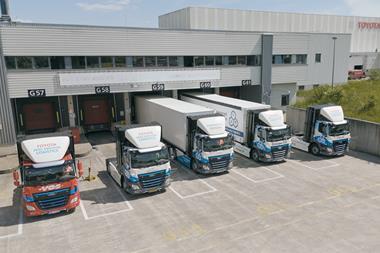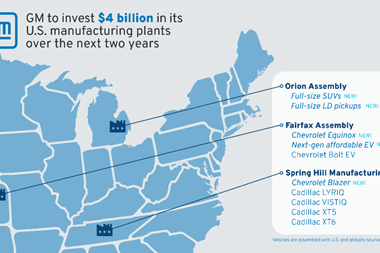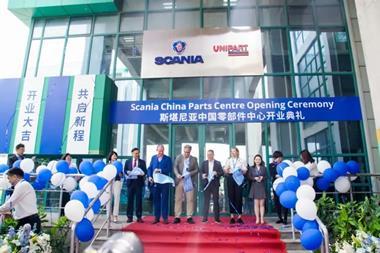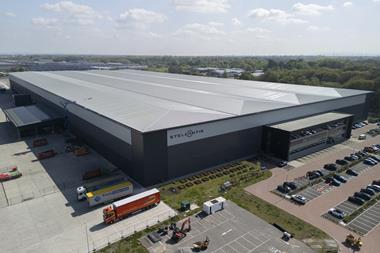 After winning a European Startup Prize for Mobility earlier this year, there are growing signs that Hamburg-based Cargonexx is on its way to creating what may be the largest digital transport network in Europe.
After winning a European Startup Prize for Mobility earlier this year, there are growing signs that Hamburg-based Cargonexx is on its way to creating what may be the largest digital transport network in Europe.
The German company was set up in 2016 with the explicit mission of improving truck utilisation via the use of advanced data intelligence and a new business model it refers to as the ‘intelligent trucking network’.
The Cargonexx logistics platform, launched that same year, is built on artificial neural networks that collect expert knowledge directly from dispatchers and use it to predict market conditions for loads. This is then used to combine individual loads and create optimal routes for trucks that minimise empty running, helping to reduce the costs involved for shippers and increase revenue per trip for hauliers.
“Our customers are big shippers with large volumes of truck loads. We take their loads as a responsible freight forwarder. They appreciate our low rates and the flexibility of our large trucking network. Even in peak times, the Cargonexx network can deliver. Our carrier network consists of small and mid-sized transport companies from all over Europe,” says Rolf-Dieter Lafrenz, CEO at the company.
Lafrenz says the artificial intelligence (AI)-based platform was created to address serious underutilisation of truck capacity, something a report by the Boston Consulting Group recently put at 40% by load weight across western Europe in 2016, due to trucks running empty or only partially full on return journeys. This, he says, is “not only an enormous waste of money but also a huge burden for the environment”.
“The idea came to us while we were stuck in traffic on a motorway. We had no idea of logistics but a lot of experience in digital technologies. We wondered if we could solve the traffic problems of the future with digital technology,” he explains. “We were very surprised when we realised nobody was using artificial intelligence and ‘big data’ to better plan their truck operations. So we built the technology and one year later, the first Cargonexx truck delivered its load.”
[mpu_ad]The goal, he adds, is to make the transport market more transparent, reliable, democratic and eco-friendly.
“We trained our algorithm with this data as the foundation. With every order, the algorithm learns more. It forecasts current spot market prices in milliseconds for specific routes,” says Lafrenz. “Of course, there are still price fluctuations, but they are decreasing daily. Google and Amazon use similar self-learning technologies.”
In developing the underlying technology, Cargonexx chose to rely on a combination of the company’s own expertise and collaboration with a number of partners with specialist knowledge of the field.
“We have in-house experts who run the algorithms. But we also use external experts to explore new challenges. Right now, we are building the first artificial neural network in the trucking industry. This will completely learn [on] its own and reproduce the thinking of the dispatchers,” says Lafrenz.
"We realised nobody was using artificial intelligence and big data to better plan their truck operations. So we built the technology and one year later, the first Cargonexx truck delivered its load." - Rolf-Dieter Lafrenz, Cargonexx
Capacity utilisation gainsLafrenz suggests there are three key benefits to using the Cargonexx platform. Firstly, it helps to achieve lower prices per load for customers by reducing empty running and digitising processes; use of the platform can activate about a third of previously unused truck capacity and help shippers to save about 15% in all, according to the company’s experiences so far. Secondy, it offers high availability of truck space, even at peak times and on fluctuating volumes, because of the huge network behind it. Finally, thanks to the entire process chain being digitised, it can provide more accurate status information than some alternatives.
There are already 5,000 carriers registered on the Cargonexx platform, together operating more than 70,000 trucks
“We are the first data-based intelligent transport network built to reduce idle capacity and save transaction costs,” explains Lafrenz. “Moreover, we do not work as a freight exchange or brokerage platform, but offer a completely new service for our customers. Where others only mediate, we ourselves take risks.”
Winning the European Startup Prize for Mobility, from the European Parliament and the European Commission, earlier this year is a notable feather in the company’s cap, as it was one of only four winners sharing this honour, selected from more than 500 mobility start-ups across the continent.
Ongoing optimisationLafrenz says the company’s ultimate goal is to minimise empty running across Europe. To achieve this, he says, optimisation dependencies must be permanently recalculated and the network constantly and automatically optimised. The Cargonexx vision, therefore, is to use AI and digital processes to carry out automatic optimisation across a large European transport network, in which quantities and capacities can be predicted and combined into route combinations.

Should autonomous trucks be driving on the continent’s roads from 2025, Lafrenz predicts that connecting them to the company’s system would allow for “immense” savings in transaction costs and CO2 emissions. “Currently, we are the only company on this journey. [Other platforms] just replace the forwarding agency; we are building our own intelligent network,” he says.
In terms of automotive logistics specifically, Cargonexx is already being used for some inbound logistics operations, though Lafrenz declines to name specific customers. There are also opportunities to refine trucking operations in the finished vehicle and express sectors, incuding spare parts distribution, he suggests.
“We are already working in the classic long-haul area of the automotive logistics industry, because this is the largest and most standardised area and we can reach a critical mass in the reduction of idle capacities here most easily. Further sub-areas will be added step by step,” he says.The analyst's viewCathy Morrow Roberson, senior analyst at the Georgia, US-based research and consulting company Logistics Trends & Insights, suggests that the Cargonexx platform could be very useful in planning routes and managing capacity in a more cost-effective manner.
“Today’s trucking environment in the US, as well as in Europe, is challenging, due to driver shortages, increasing regulatory requirements and rising demand. A solution such as this could potentially rival traditional freight brokers, but at the same time it could also be a good partnership [for them],” she comments.
As far as the automotive logistics sector is concerned, Roberson believes one of the greatest benefits of the Cargonexx platform, alongside the operational efficiencies, will be better management of shipping costs, “particularly in managing spare parts logistics programmes and just-in-time inventory replenishment”.
“AI and predictive analysis also have great capabilities for forecasting,” she adds. “For automotive logistics, the ability to forecast when and where a shipper or carrier will need capacity can be useful. AI can help shippers and carriers be more proactive versus reactive, and thus delivery times, for example, could be greatly reduced.”
While acknowledging that similar solutions are already available, Roberson argues that AI technology, such as that used by Cargonexx, could soon replace existing solutions for more complex data analytics.
“I see such technology being used in transport management systems to plan routes and optimise networks, for capacity management and much, much more – all in real time using internal ‘hidden’ data as well as external data,” she says. “In addition, think about contingency planning such as a facility shutdown or any other supply chain disruption – AI tools have the potential to work around such situations.”


































